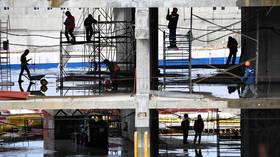‘Not a gulag’: Russia’s government in talks to create new convict labor super-camps to cut need for migrants, minister reveals

Russian officials are now in talks with big business in an effort to secure investment for a network of large-scale prison labor complexes that could reduce the country's reliance on migrant workers, it was confirmed on Monday.
“We are negotiating with companies, concluding agreements and actively working in this direction,” Minister of Justice Konstantin Chuychenko told reporters. “And in the near future, we have plans to increase the number of correctional centers and places within them.”
Chuychenko said they “are very interested in large investment projects, where a thousand people or more could serve sentences by carrying out correctional labor.”
“The idea of replacing migrant labor [with inmate labor], I think, is correct,” he added, “because correctional centers can be set up at large construction sites and large industrial facilities.”
Also on rt.com Throwing in the trowel: As construction demand booms, Russia short 1.2mn builders after migrants left during Covid pandemicThe latest round of discussions about the idea, which has proven controversial domestically, was started by the national penal system director, Aleksandr Kalashnikov, last week. Citing a shortage of migrant labor from Central Asia, he said around 188,000 prison inmates across the country should have the right to work through their jail terms.
The minister pointed out that the existing capacity for prison workers to take on these jobs is inadequate, with most work colonies boasting only around 100 jobs. However, he said, the country has already created 8,000 jobs for prisoners, which would enable them to earn extra cash while also learning skills and demonstrating they can be reintegrated into society.
“We are ready to organize this. It will not be a gulag - it will be absolutely new, decent conditions,” he insisted, adding that participants would receive a “decent salary” for their efforts.
In March, the Russian government warned that there was a shortfall in migrant workers in a number of key economic sectors, such as construction. “There is a personnel problem,” Minister of Construction, Housing and Utilities Irek Fayzullin told reporters. “A large number of builders who came from the near-abroad [former Soviet states] were forced to leave due to the coronavirus.”
Also on rt.com Echoes of the Gulag? Migrant advocate slams suggestion by Russian prison chief that convicts be used to replace foreign workersHowever, the head of the country’s Federation of Migrants criticized the idea that prisoners could be used to fill the gap. Vadim Kozhenov asked journalists, under the proposals, “who will educate [the prisoners]?... Migrants are sufficiently qualified. [But] the FSIN would have to somehow organize all the prisoners and try to understand who is a bricklayer, who is a plasterer, and who is a carpenter.”
The idea of prison labor has been floated in Russia many times and is widely used abroad, including in the US, where a vast majority of the country's more than 2 million inmates work in some capacity. Last year, a row broke out over New York's decision to use those serving time to produce tens of thousands of gallons of hand sanitizer to counter the Covid-19 pandemic, despite the inmates' reported vulnerability to the virus in crowded conditions.
Despite other nations relying on the pool of potential workers, for some, it still sounds too much like a return to the brutal Soviet gulag camp system. Well over 1 million people are thought to have died in the penal colonies due to disease, harsh conditions and executions, and much of the rural infrastructure in the Far East and Siberia can be traced back to forced labor.
Think your friends would be interested? Share this story!













